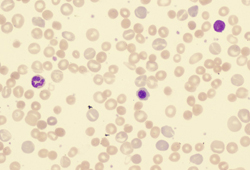Summary
Definition
History and exam
Key diagnostic factors
- presença de fatores de risco
- palidez
- icterícia
Other diagnostic factors
- fadiga
- dispneia
- tontura
- esplenomegalia
- infecções ativas
- urina escura episódica (hemoglobinúria)
- desencadeada por exposição ao frio
Risk factors
- doenças autoimunes
- distúrbios linfoproliferativos
- valva cardíaca protética
- origem familiar no Mediterrâneo, no Oriente Médio, na África ou no Sudeste Asiático
- história familiar de hemoglobinopatia ou de defeitos na membrana dos eritrócitos
- hemoglobinúria paroxística noturna
- exposição recente a cefalosporinas, penicilinas, derivados de quinina ou anti-inflamatórios não esteroidais
- exposição recente a naftaleno ou a favas
- lesão térmica
- esforço excepcional
- exposição recente a nitritos, dapsona, ribavirina ou fenazopiridina
- ingestão recente de paraquat
- malária
- babesiose
- bartonelose
- leishmaniose
- Infecção por Clostridium perfringens
- Infecção por Haemophilus influenzae tipo B
- doença hepática
Diagnostic tests
1st tests to order
- Hemograma completo
- CHCM
- contagem de reticulócitos
- esfregaço de sangue periférico
- bilirrubina (indireta) não conjugada
- lactato desidrogenase (LDH)
- haptoglobina
- urinálise
Tests to consider
- teste de antiglobulina direto (Coombs)
- creatinina, ureia
- TFHs
- anticorpo Donath-Landsteiner
- eletroforese de Hb
- citometria de fluxo para CD55/CD59
- teste do ponto fluorescente com lâmpadas ultravioletas e espectrofotometria de glicose-6-fosfato desidrogenase (G6PD)
- fator antinuclear (FAN)
Treatment algorithm
adquirido: teste de antiglobulina direto ("Coombs") positivo
adquirida: teste de antiglobulina direto (Coombs) negativo
doenças hereditárias
Contributors
Authors
John Densmore, MD, PhD
Associate Professor of Clinical Medicine
Department of Medicine
University of Virginia
Charlottesville
VA
Disclosures
JD declares that he has no competing interests.
Acknowledgements
Dr John Densmore would like to gratefully acknowledge Dr Michelle Loch, a previous contributor to this monograph. ML declares that she has no competing interests.
Peer reviewers
Pasquale Niscola, MD
Hematology Unit
Sant'Eugenio Hospital
Rome
Italy
Disclosures
PN declares that he has no competing interests.
Alan Lichtin, MD
Staff Hematologist-Oncologist
Hematologic Oncology and Blood Disorders
Cleveland Clinic
Associate Professor
Internal Medicine
Cleveland Clinic Lerner College of Medicine
Cleveland
OH
Disclosures
AL declares that he has no competing interests.
References
Key articles
Go RS, Winters JL, Kay NE. How I treat autoimmune hemolytic anemia. Blood. 2017 Jun 1;129(22):2971-9 Abstract
Hill QA, Stamps R, Massey E, et al. The diagnosis and management of primary autoimmune haemolytic anaemia. Br J Haematol. 2017 Feb;176(3):395-411.Full text Abstract
Hill QA, Stamps R, Massey E, et al. Guidelines on the management of drug-induced immune and secondary autoimmune, haemolytic anaemia. Br J Haematol. 2017 Apr;177(2):208-20.Full text Abstract
Reference articles
A full list of sources referenced in this topic is available to users with access to all of BMJ Best Practice.

Differentials
- Anemia por sangramento
- Anemia por subprodução
- Reação transfusional
More DifferentialsGuidelines
- Guidelines for the monitoring and management of iron overload in patients with haemoglobinopathies and rare anaemias
- Diagnosis and treatment of autoimmune hemolytic anemia in adults
More GuidelinesVideos
Venopunção e flebotomia – Vídeo de demonstração
Canulação venosa periférica – Vídeo de demonstração
More videosLog in or subscribe to access all of BMJ Best Practice
Use of this content is subject to our disclaimer